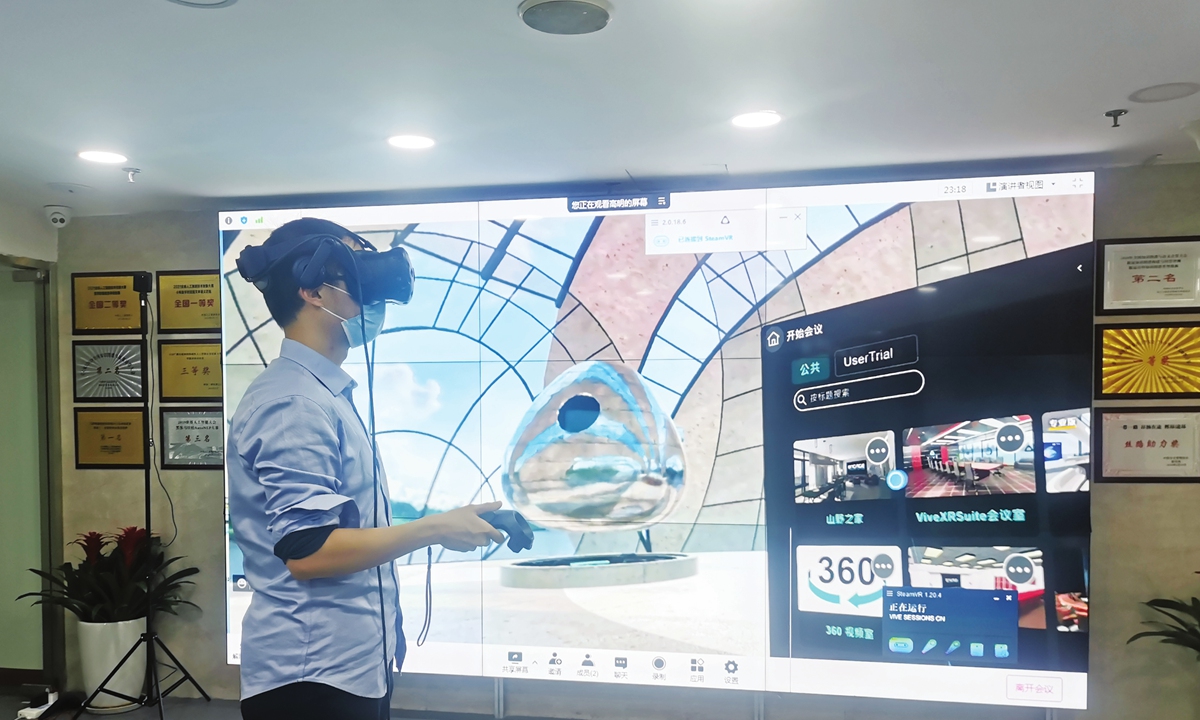Metaverse matters despite all its hype
Prowess crucial to China’s innovation, tech strength in coming decades: industry voices

A man has hands-on experience of an online virtual world at Qingbo's newly unveiled metaverse lab in Beijing on November 9, 2021. Photo: Courtesy of Qingbo
If there's any buzzword that's trendier than metaverse in China, it must be metaverse itself, although the item of jargon has almost instantly bewildered most of the world's largest internet population.
The puzzlement, instead of becoming a disappointment, is turning out to be a shortcut to inflated commercial success for some, according to Global Times' interviews with two Chinese leading industry voices. They nonetheless weighed the next big thing that's far beyond the current focus on virtual reality (VR) and online games over a practically inevitable hype in notably the stock market during the initial stage of any novel phenomenon.
Vying for a foothold in the global race for metaverse prowess, based on a raft of emerging technologies including cloud computing, VR, augmented reality (AR), 5G, blockchain and artificial intelligence (AI), is set to be crucial to China's push for innovation-oriented growth and technological strength in decades to come, they opined.

metaverse
Viral term
The current hype about metaverse, especially in wealth creation terms, is to a certain extent inflated, insiders said.
With hands-on experience of a metaverse largely revolving around a migration from computers- and a mobile phones-enabled virtual presence to VR, mixed reality-based online life over the next three to five years, an accessible metaverse for the foreseeable future remains far from what the term was envisaged to visualize, Xiang Anling, a PhD candidate from the School of Journalism and Communication of Tsinghua University, told the Global Times.
Xiang was one of the authors of a concise yet adequately informative report about metaverse that was released in mid-September and has since become one of the most-cited Chinese metaverse manuals ever since.
A search for the report on Chinese search engine Baidu has revealed results of more than 2.3 million, according to Xiang, not having factored in a multitude of retweets and sharing of the report on social media including WeChat and Weibo.
With US tech giant Facebook renaming itself as Meta Platforms in late October, explicitly revealing CEO Mark Zuckerberg's intention to make a big splash in the surround-yourself technology, metaverse has become all the rage.
The buzzword envisions a continuation of online 3D virtual environments in which people could have their virtual avatars and do shopping and businesses, among wide-ranging activities. Such a hypothesis was already partially present on video games like Second Life, an application released by US digital entertainment developer Linden Lab in 2003 that allows for the creation of avatars and the experience of a second life in an online world.
Buoyed by the metaverse sensation, shares of California-based Roblox, one of the most convincing creators of a metaverse virtual world, have been on a bull run over the past month.
The rally apparently fed bullishness through A shares also, with an array of firms categorized or self-claimed as metaverse concept stocks - mostly game developers and VR gadget makers - on a tear with their stocks soaring as much as more than double since late October.
In another striking sign of the eagerness to get close to the metaverse mystery, a six-episode online course about metaverse that costs 29.9 yuan ($4.69) has reportedly been signed up for by 40,000 people, suggesting revenues of over 1.2 million yuan.
The metaverse-induced capital excitement could well to a certain extent be overblown, if relevant firms are merely conventional gadget makers or game developers that are not truly committed to metaverse in a way similar to Roblox that's considered to be a metaverse itself, according to Xiang, who is also the executive deputy head of the research institute affiliated with Qingbo, a Beijing-based big data and AI services provider whose clients include Alibaba, Tencent, Baidu and ByteDance.
It's not until at least 20 years later when brain-computer interfaces become readily available, a genuinely viable metaverse would be present, Xiang said.
VR and online games are just a small portion of the entire metaverse development, as they are less risky yet also more publicly acceptable, giving a rough glimpse to metaverse, Yu Jianing, executive director of the China Mobile Communication Association Metaverse Industry Council, told the Global Times, speaking of both sincere and speculation-motivated ventures into the online worlds.
Crucial to future strength
Concerns over a premature hype ought not to serve as a roadblock to an exploration into metaverse-related opportunities that have increasingly shown to be a global race, the experts stressed.
In a fresh sign, Russian President Vladimir Putin stated that people need to take advantage of meta-universes-enabled opportunities for communication and education despite the distance, while addressing a recent AI-themed internationally conference, media reports said.
The metaverse development, essentially Web 3.0, doesn't simply rely on one or several technologies, but the innovative grouping and integration of various cutting-edge digital technologies such as cloud computing, distributed storage, VR, AR, 5G, blockchain, AI, according to Yu, who is also former director of the research institute of industrial economics under the Ministry of Industry and Information Technology.
"That metaverse will become a major battlefield for [competition] in innovation between countries is a definite outcome of digital economic development," Yu said, reckoning the metaverse development as aiming for deeper incorporation of the digital economy into the real economy, for there to be a comprehensive upgrading of the real economy.
While countries including South Korea and Japan have mulled over government-led initiatives to dig out metaverse-generated growth, China is also moving toward riding the metaverse wave.
A conspicuous sign was the metaverse council Yu's now with. Launched on Thursday, it's the first-of-its-kind industry group in the country was approved in mid-October.
Other high-profile efforts toward building Chinese-origin metaverse footprint include several trademarks Alibaba recently registered related to the buzzword, including Ali Metaverse and a metaverse vision recently unveiled by Tencent.



